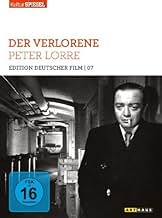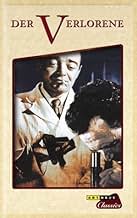VALUTAZIONE IMDb
7,0/10
1214
LA TUA VALUTAZIONE
Aggiungi una trama nella tua linguaGerman scientist murders his fiancée during World War II when he learns that she has been selling the results of his secret research to the enemy.German scientist murders his fiancée during World War II when he learns that she has been selling the results of his secret research to the enemy.German scientist murders his fiancée during World War II when he learns that she has been selling the results of his secret research to the enemy.
- Regia
- Sceneggiatura
- Star
- Premi
- 1 vittoria e 1 candidatura in totale
Helmuth Rudolph
- Colonel Winkler
- (as Helmut Rudolph)
Eva Ingeborg Scholz
- Ursula Weber
- (as Eva-Ingeborg Scholz)
Peter Ahrweiler
- Oberstleutnant Marquardt
- (non citato nei titoli originali)
Josef Dahmen
- Lieske, canteen bartender
- (non citato nei titoli originali)
Helmut Eichberg
- Oberstleutnant Bydersahn
- (non citato nei titoli originali)
Kurt Fuß
- Baldheaded Man
- (non citato nei titoli originali)
Joachim Hess
- Leutnant
- (non citato nei titoli originali)
Richard Münch
- Criminal Inspector #1
- (non citato nei titoli originali)
Recensioni in evidenza
10pyamada
Lorre, perhaps like Charles Laughton, had only this chance to direct. Like Laughton, Lorre made an excellent film, and encountered no problems whatsoever concerning complete control of the film, unlike Laughton, whose film was given a crude ending as a gift from the studio. This is a beautiful, poetic movie about horrible subjects, and the complicated reactions and perspectives one will have about these characters, especially Lorre's, teaches us much about Germany, the Nazis and aspects of the war in general. While there are passing similarities in content to Wilder's A Foreign Affair, Die Verlorne is so much the better movie, so much more poetic (perhaps than anything Wilder ever did), and so moving, in brutal ways, that it just has to be considered one of the best and most powerful and most depressing films ever made.
Somehow Peter Lorre wanted to make a comeback in post war Germany with this movie. He plays the principal role in Der Verlorene, a little guy stumbling through the Nazi years in Germany and ending up just wanting to put an end to his life (apparently based on a true story). He also directed and participated in the screen writing. And that was probably too much. The movie is ill paced and takes several unexpected turns which break down the narrative rhythm. The movie also seems to shift in an uneasy way into different genres. It starts out as a solid firm noir with a flashback, a love story, betrayal and a murder. Then Lorre reverts to his role in Fritz Lang's M and becomes a psychotic woman hater and mass murderer. Then, back in the noir mode, he stumbles inadvertently into the preparation for the assassination of Hitler (a real event that took place in 1944) and, believe it or not, the movie definitely becomes a kind of a black comedy. The main character ends up a tragic clown who can not be taken seriously (and I am pretty sure it was not meant that way). Some plot details are plainly ludicrous and do not work. An example: Lorre's character takes to strangling women who try to "make him hot". They are decidedly bigger and larger than he is and all look as if they would put up fierce resistance against a strangling Lorre, probably easily overpowering him. But they react like frightened lambs I just had to laugh at that, or was I missing a crucial symbolic twist here? However, other aspects of the movie are interesting. The theme of betrayal and double cross are cleverly presented as the essence of every day life in Nazi Germany. The set design and the scenes shot on location somewhere in Germany create an oppressive atmosphere with darkened parlours, basement laboratories, bleak apartments and landscapes of ruins and emergency shelters. Actually, all the elements that make a good movie are there and in itself well presented: some good dialogue, the observation, the surprise moments, the suspense and even a car chase. There are some very good female parts. The game of flirting and sexual innuendo is presented in a frankness that was pretty drastic for the period, I guess. But these elements stand by themselves and unfortunately don't come together to form a good movie. Robert Siodmak's thematically related movie Nachts, wenn der Teufel kam was a much more convincing comeback with a film that transports American noir mode to Nazi Germany.
After years of dreary labor in Hollywood as a professional "evil foreigner," Lorre went home to Germany to write, direct and star in this dark, dreamlike narrative in which he plays the ultimate Peter Lorre character: a Nazi mad doctor sex murderer. The film is an ironic commentary by Lorre, the reluctant impersonator of psychopaths, on the nature of true psychopathology as embodied in the amoral Nazi regime. It's also an ingenious melding of the sort of B-film noir that Lorre had specialized in for years as an actor (Maltese Falcon, Stranger on the Third Floor, Quicksand) and the impressionistic Nouvelle Roman/Nouvelle Vague influenced art film just picking up steam on the continent (shades of Orpheus, Wild Strawberries, and Last Year at Marienbad can be seen in its shadowy enfolding of past/present and dream/reality.) Though somewhat uncertain in balancing himself between his roles as principal actor and director (the motivations of some of the other characters are somewhat murky, for instance, and it's rather a shock to see Peter Lorre so continually being the object of women's lustful attentions) this was clearly a man with the makings of an ingenious and original filmmaker. It's a shame this film isn't better known, and that Lorre never got the chance to make another.
10vferenz
Der Verlorene is an extraordinary film noir not only as text but also in its context. This film disappeared after only ten days from german screens although most critics said that it´s the best german film after WW II. The reasons are very simple: First, it was too late. This film five years earlier in 1946 would have been the Trümmerfilm par excellance. Compare it to Die Mörder sind unter uns and you will see the huge difference. Second, in the upcoming era of Wirtschaftswunder no one in whole Western Germany wanted a reminder on what their industry and morality was build on: the Third Reich. Consider this, when Marlene Dietrich came back to Germany many people shouted: Go home! In the 1950s one producer said about Fritz Kortner: Hitler could have burnt more Jews. This way of thinking wasn´t elimated and still it´s not. Nowadays WW II is good for action flics (Saving Private Ryan and all this crap) or love stories (for example this desaster Enemy at the Gates). It´s depressing but one shouldn´t get mad over it. Just see Der Verlorene and you will see there were people how to handle this topic in an adequate manner. Maybe there are some filmmakers out there who still know. Let´s hope for it.
This unique German noir is a weird film, to say the least. A doctor at a vaccination clinic makes an interruption in his work, when another doctor comes there to assist him, who is a dark shadow out of his past. During the war he was a researcher achieving great findings and results, and that suddenly appearing man was his assistant, stealing his research results and selling them to the enemy, using his betrothed for a bait, so he stole both his work and his fiancée. Peter Lorre is the doctor who can't forgive his betrothed for her treason, so he strangles her in the most sensitive scene of the film (without showing the strangulation - it is only reported afterwards,) and from that moment on he is a lost man. All this is shown in flashbacks, as Lorre has a long talk with his old colleague while drinking and smoking, sorting things out, to reach a settlement. The film and the story is complicated, the flashbacks are confusing, the story involves both Nazi plots, bombings of Hamburg, another improvised murder, proving the liability of the psychopath Peter Lorre has grown into, and everything is draped in very dark shadows and abysmal moods, the character of the film is apocalyptic, and shadows play an important part in the cinematography. It is fascinating and weird, deeply disturbing and melancholy at the same time, poignantly pinpointing the mood of post war Germany among the ruins of both Hamburg and people, in a world where no one can feel at home or safe or any security any more.
Lo sapevi?
- QuizPeter Lorre's only film as director
- Curiosità sui creditiExplanatory caption (in German) in opening credits: This film is not a work of fiction. The events are based on factual reports from the last few years.
- Versioni alternativeThere is an Italian edition of this film on DVD, distributed by DNA srl, "UN UOMO PERDUTO (1951) + CRIME AND PUNISHMENT (Ho ucciso!, 1935)" (2 Films on a single DVD), re-edited with the contribution of film historian Riccardo Cusin. This version is also available for streaming on some platforms.
- ConnessioniFeatured in Displaced Person - Peter Lorre und sein Film 'Der Verlorene' (2007)
I più visti
Accedi per valutare e creare un elenco di titoli salvati per ottenere consigli personalizzati
Dettagli
- Tempo di esecuzione1 ora 38 minuti
- Colore
- Mix di suoni
- Proporzioni
- 1.37 : 1
Contribuisci a questa pagina
Suggerisci una modifica o aggiungi i contenuti mancanti

Divario superiore
By what name was L'uomo perduto (1951) officially released in Canada in English?
Rispondi



























